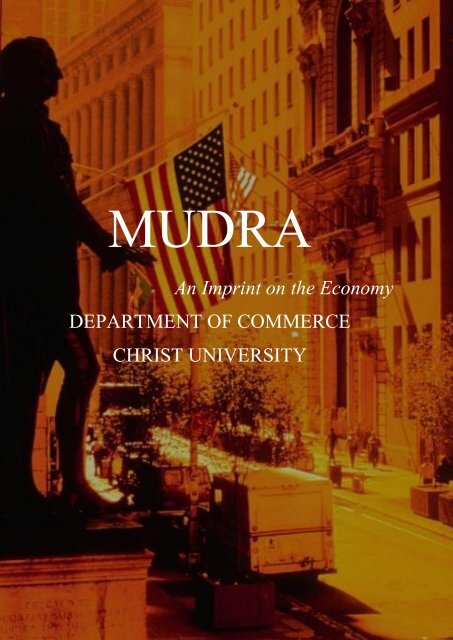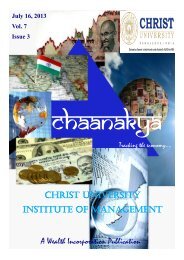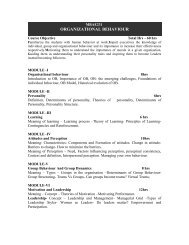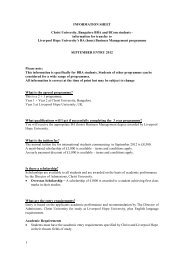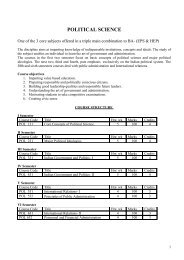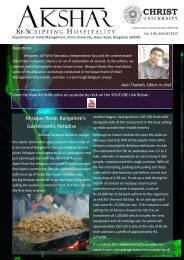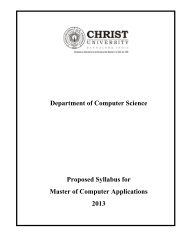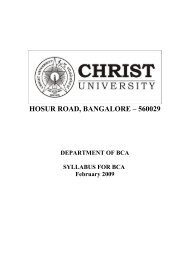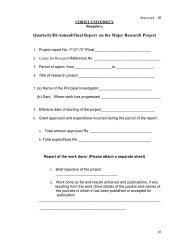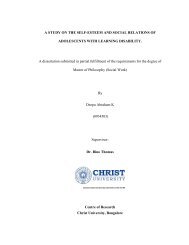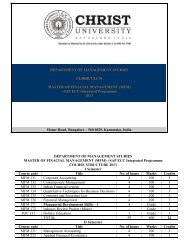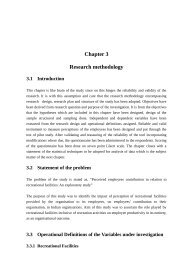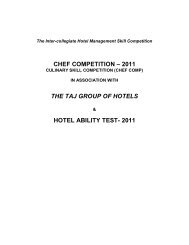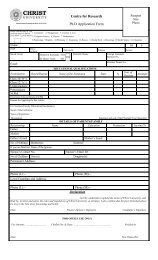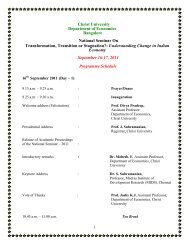MUDRA MAGAZINE AUGUST EDITION - Christ College
MUDRA MAGAZINE AUGUST EDITION - Christ College
MUDRA MAGAZINE AUGUST EDITION - Christ College
Create successful ePaper yourself
Turn your PDF publications into a flip-book with our unique Google optimized e-Paper software.
<strong>MUDRA</strong> <strong>MAGAZINE</strong> <strong>AUGUST</strong> <strong>EDITION</strong><br />
<strong>MUDRA</strong><br />
An Imprint on the Economy<br />
DEPARTMENT OF COMMERCE<br />
CHRIST UNIVERSITY<br />
Page 1
<strong>MUDRA</strong> <strong>MAGAZINE</strong> <strong>AUGUST</strong> <strong>EDITION</strong><br />
CONTENTS<br />
1) THE TEQUILA CRISIS, IN A NUTSHELL 3<br />
2) EURO WILL BECOME A CARRY TRADE 6<br />
CURRENCY<br />
3) GREECE‟S SAGA OF QUANDARIES 9<br />
4) ANY GUESSES FOR WHO THIS FAMOUS 12<br />
PERSONALITY IS?<br />
5) BOOK REVIEW 15<br />
6) THE POWER OF A DREAM 17<br />
7) HEADS OF INTERNATIONAL 20<br />
ORGANISATIONS<br />
8) HEADS OF INDIAN 23<br />
ORAGNISATIONS<br />
9) ABBREVIATIONS 25<br />
10) BUSINESS QUIZ 26<br />
Page 2
<strong>MUDRA</strong> <strong>MAGAZINE</strong> <strong>AUGUST</strong> <strong>EDITION</strong><br />
THE TEQUILA CRISIS, IN A NUTSHELL<br />
Mexico suffered its worst economic crises under the presidency of Carlos<br />
Salinas de Gortari, an economist and reformer whose 6 year administration<br />
ended with a budget deficit of 7% and the economy in shatters. In 1981 a<br />
technocratic government came to power and deregulated the Mexican<br />
economy, appointed PhDs from Ivy Universities to run the Government.<br />
Even with all that reforms underway the economy grew by less than 1%<br />
during 1981-89. No payoff emerged after all those reforms, in 1994 wages<br />
were still below 1981 levels because of the overvalued peso. The country‟s<br />
currency(peso) was indexed to the dollar, 1 Dollar=1 Peso, making its<br />
goods expensive relative to other countries, established currency board had<br />
a negative impact and pegging the Peso to the Dollar laid the groundwork<br />
for their own demise.<br />
Page 3
<strong>MUDRA</strong> <strong>MAGAZINE</strong> <strong>AUGUST</strong> <strong>EDITION</strong><br />
In December of 1994 devaluation took place, but speculators didn‟t say "ok<br />
that‟s over" and stopped betting on the currency's continued decline, that<br />
was how it worked in Britain and Sweden in 1992, danger is the<br />
speculators will view the 1st devaluation as a sign of more to come and if u<br />
make devaluation big enough you don‟t set up expectations for more to<br />
come. Mexico broke both rules, gave sentences a kinetic dimension, initial<br />
devaluation was 15%, only half of what economists were suggesting,<br />
government behaved arrogantly, massive capital flight was inevitable and<br />
the country abandoned its fixed exchange rate, finance minister Serapoche<br />
was replaced. Foreign investors were "shocked", currency fell to half the<br />
pre-crises value, pressing problem was that they could not finance long<br />
term debt and accumulated substantial amount of short term debt, the need<br />
to pay high interest rates on that debt which was a major problem in 1980s<br />
due to populist policies.<br />
Page 4
<strong>MUDRA</strong> <strong>MAGAZINE</strong> <strong>AUGUST</strong> <strong>EDITION</strong><br />
If a country is running a deficit on its current account, buying more goods<br />
than it sells it must correspondingly be running equal surplus in its capital<br />
a/c, selling more assets than it buys, this however did not work in the<br />
Economy, defeated in a 100 different ways it accepted the Brady deal of<br />
1989, it gave more confidence to the market and government could roll<br />
over debt, by march it paid interest rates of 75%, to convince the market<br />
that it would not devalue, converted billions of short term debt into so<br />
called „Tesobonos‟, indexed to the dollar size of dollarized debt exploded,<br />
reinforced the sense of panic ,in 1995 real GDP plunged 7%.<br />
Page 5<br />
By:<br />
Abhith Pallegar<br />
III B.Com (Hons) „J
<strong>MUDRA</strong> <strong>MAGAZINE</strong> <strong>AUGUST</strong> <strong>EDITION</strong><br />
EURO WILL BECOME A CARRY TRADE<br />
CURRENCY<br />
The Euro is exhibiting signs of becoming a carry trade currency. Carry<br />
trade is when markets borrow in one currency to fund the purchase of<br />
assets in another currency. The end result is a general weakening of the<br />
funding currency and rise in prices in some asset classes.<br />
The last one month has seen the Euro fall by over<br />
5% against the US Dollar (USD). The Euro has<br />
come off from USD 1.34 to USD 1.27 since the<br />
beginning of December 2011 to date. Equity indices<br />
in the same period have been positive to mildly<br />
negative across geographies. US and European<br />
indices have gained over the last one month even as<br />
the Euro fell to one year lows. A one month trend may not be a precursor<br />
to the future, but looking at the fundamentals of the Euro, the trend may<br />
well continue. The trend of a weakening Euro and rising equity prices is a<br />
good possibility for the rest of 2012.The fundamentals of the Euro have<br />
weakened considerably over the last few months. A large part of the Euro‟s<br />
strength was derived from the fact that the ECB‟s (European Central Bank)<br />
sole mandate was inflation targeting. The mandate has not formally<br />
changed but the ECB is now getting sucked into the debt problems<br />
plaguing Eurozone countries. The move by the ECB to lend unlimited<br />
funds for three years at 1% to European banks is an indirect effort to bail<br />
out debt ridden countries that are unable to refinance debt. The last auction<br />
of funds in December 2011 saw banks borrowing close to 500 billion Euros<br />
from the ECB.<br />
Page 6
<strong>MUDRA</strong> <strong>MAGAZINE</strong> <strong>AUGUST</strong> <strong>EDITION</strong><br />
ECB has consistently been expanding its balance sheet since 2008, when<br />
the credit crisis forced central banks to lend against securities to stem a<br />
liquidity crisis. The debt problems of Eurozone countries have forced the<br />
ECB to buy bonds of the debt ridden countries of Italy, Spain, Portugal and<br />
Greece. ECB‟s assets have grown from less than Euro 1.4 trillion in 2008<br />
to Euro 2.7 trillion in 2011. A central bank pumping liquidity into the<br />
system is a cause for currency weakness.<br />
The ECB has cut interest rates from 1.5% to 1% over the last two months.<br />
The Eurozone debt issues and the resultant threat to growth as governments<br />
adopt austerity measures to cut debt prompted the cutting of policy rates.<br />
The fall in Eurozone inflation to 2.8% in December 2011 from 3% in<br />
Page 7
<strong>MUDRA</strong> <strong>MAGAZINE</strong> <strong>AUGUST</strong> <strong>EDITION</strong><br />
November 2011 is an indicator of falling inflation expectations.<br />
Unemployment is at over 10% levels in the Eurozone and forecasts of a<br />
mild recession this calendar year will not help in improving job prospects.<br />
The ECB will have to cut rates further to prop up the Eurozone economy.<br />
In contrast to the Eurozone economics, the US economy is looking much<br />
better. The latest numbers coming out of the US is positive with<br />
manufacturing growth for December 2011 at six month highs and<br />
unemployment rate coming off to three lows at 8.5%. The US has been<br />
continuously adding jobs albeit at a slow pace with December 2011 seeing<br />
job additions of 200,000. The US Federal (Fed) has pledged to maintain<br />
interest rates at zero percent till 2013 and this will help US economy to<br />
grow at a better pace than the Eurozone. Markets will look at rising growth<br />
differentials between the Eurozone and the US and will take down the Euro<br />
further against the USD. An equity market rally across the globe with the<br />
Euro as the funding currency is well on the cards. Low Eurozone interest<br />
rates and high liquidity from the central bank will can act as a catalyst for<br />
carry trades. Commodities may not rally on the back of a strong USD.<br />
India can benefit from a global equity rally driven by cheap Euro funding.<br />
Interest rate differentials work in favour for India, as policy rates are<br />
750bps above ECB rate of 1%. Growth differential also works in favour for<br />
India as it is growing at 7% against a zero or negative growth in the<br />
Eurozone. Stable to weak commodity prices on the back of a strong USD<br />
will benefit India as it brings down inflation expectations. The markets are<br />
now in a completely unknown territory as well established fundamentals<br />
have broken down. Hence a rally led by Euro will be new to the markets<br />
and it remains to be seen how it will pan out.<br />
By:<br />
M. Maria Monica<br />
5 B.Com C<br />
Page 8
<strong>MUDRA</strong> <strong>MAGAZINE</strong> <strong>AUGUST</strong> <strong>EDITION</strong><br />
GREECE‟S SAGA OF QUANDARIES<br />
The recent Euro zone meltdown has made many countries approach IMF<br />
with a begging bowl especially the PIGS (Portugal, Ireland, Greece and<br />
Spain). The debt levels of these countries and many other strong economies<br />
have gone spiraling up; the Debt to GDP ratio of Ireland is at 43%, Spain at<br />
11%, Portugal at 10%, France at 10% and Germany at 9% and Greece at<br />
Some of you might think that some of the economies such as Spain or<br />
Portugal have the debt levels comparable to Germany or France but the<br />
problem of these countries stems from higher current account deficit. A<br />
country running high current account deficit should also run high capital<br />
account surplus to maintain the monetary balance. Papandreou who came<br />
into power in 2009acknowledged high debt levels in the economy and went<br />
public with that sentiment, however, his timing couldn‟t have been more<br />
unpalatable which for the last 15 years was at 100% of GDP. The fact<br />
which his predecessor had covered up. Greek has its debt level at 150% of<br />
GDP and a high current account deficit. It is neither endowed with rich<br />
natural resources nor does it produce trucks or other high value goods.<br />
Page 9
<strong>MUDRA</strong> <strong>MAGAZINE</strong> <strong>AUGUST</strong> <strong>EDITION</strong><br />
However the main problem of Greece is not of high debt levels or inability<br />
to pay off the outside creditors but the inefficiency of the Greek economy<br />
and this makes Greece's consecutive rounds of fiscal stimulus ineffective.<br />
Greek currently has 2 options:<br />
� Ask its allies and the IMF for more aid<br />
� Declare bankruptcy which is not a politically acceptable option.<br />
Americans in the spring of 2010 provided 150 billion dollars expecting a<br />
Europe- wide recovery which was eventually ineffective. The two largest<br />
sectors of the Greek economy are tourism and shipping which have seen<br />
shipping rates fall by 90% in the last 3 years. Greek is caught in a web of<br />
fundamental macroeconomic under performance of which it has no control<br />
although refinancing has taken place but in vain.<br />
Page 10
<strong>MUDRA</strong> <strong>MAGAZINE</strong> <strong>AUGUST</strong> <strong>EDITION</strong><br />
The IMF may step up to a second major aid package but this will in no way<br />
reduce the debt to GDP ratio of the country. The bulk of debt owed by the<br />
Greeks is taken out of private hands and placed in public hands which will<br />
not be negatively affecting the domestic markets. Ultimately default has to<br />
occur, the only question is whether the default will be orderly or messy.<br />
By:<br />
Abhith Pallegar<br />
III B.Com (Hons) „J‟<br />
Page 11
<strong>MUDRA</strong> <strong>MAGAZINE</strong> <strong>AUGUST</strong> <strong>EDITION</strong><br />
ANY GUESSES FOR WHO THIS FAMOUS PERSONALITY IS?<br />
EVER DRANK COKE?<br />
THEN YOU SHOULD KNOW THE ANSWER…<br />
IT IS MUHTAR KENT, CHARMAN AND CEO OF THE COCA<br />
COLA COMPANY.<br />
A BRIEF PROFILE:<br />
Muhtar Kent was born in 1952 in New York. A Turkish-American<br />
business executive, He is the Chairman and Chief Executive Officer<br />
(CEO) of The Coca-Cola Company.<br />
Muhtar Kent is of the Muslim faith. After completing high school at<br />
Tarsus American <strong>College</strong> in Mersin, Turkey in 1971, Muhtar Kent<br />
went to the United Kingdom to study at the University of Hull.<br />
Page 12
<strong>MUDRA</strong> <strong>MAGAZINE</strong> <strong>AUGUST</strong> <strong>EDITION</strong><br />
Subsequently, he earned his MBA degree at Cass Business School,<br />
London.<br />
1<br />
Muhtar Kent at the World Economic Forum in Davos, 2010.<br />
KENT‟S INSPIRING JOURNEY TO THE TOP…<br />
Muhtar Kent found a job at The Coca-Cola Company through a<br />
newspaper ad. He toured the country in trucks to sell Coca-Cola, and<br />
thereby learned its distribution, marketing and logistics systems.<br />
1985: Muhtar is promoted to the General Manager position of Coca-<br />
Cola Turkey and Central Asia, and transferred the Headquarters of the<br />
Company from Izmir to Istanbul.<br />
1989: He is as appointed vice president of Coca-Cola International,<br />
responsible for 23 countries in a region from the Alps to the<br />
Himalayas. Living in Vienna, Austria, he served at this post until<br />
1995.<br />
Page 13
<strong>MUDRA</strong> <strong>MAGAZINE</strong> <strong>AUGUST</strong> <strong>EDITION</strong><br />
1995: Promoted further, Muhtar Kent becomes Managing Director of<br />
Coca-Cola Amatil-Europe. In two years, he increases the turnover of<br />
the Company by about 50%, which covers bottling operations in 12<br />
European countries.<br />
1999: Muhtar Kent leaves the Coca-Cola Company after 20 years of<br />
service. Returning to Turkey, he assumes the post of top executive of<br />
Efes Beverage Group at Anadolu Group, the largest local shareholder<br />
of the Coca-Cola franchise in Turkey and one of Europe's largest<br />
international beverage businesses. He extends the company's territory<br />
from the Adriatic to China.<br />
2005: Rejoins Coca-Cola after almost 6 years and is appointed<br />
President and Chief Operating Officer of the Company‟s North Asia,<br />
Eurasia and Middle East Group, a position reporting directly to<br />
Chairman and CEO Neville Isdell.<br />
2006: Muhtar Kent's rise continues and is promoted in January 2006,<br />
to the newly-created position of President of International Operations.<br />
In this capacity, he was responsible for all operations outside of North<br />
America, and all group presidents outside of North America reported<br />
to him.<br />
2008: His successful career takes him finally to the summit of the<br />
Coca-Cola Company, which names him Chairman and CEO, effective<br />
July 1, 2008.<br />
Also, Kent currently serves on the Board of Directors of the National<br />
Committee on United States-China Relations. He is indeed an<br />
inspiring personality to many budding business executives of the<br />
future.<br />
By: Kazim Mirza<br />
III B.Com (Hons) „J‟<br />
Page 14
<strong>MUDRA</strong> <strong>MAGAZINE</strong> <strong>AUGUST</strong> <strong>EDITION</strong><br />
BOOK REVIEW<br />
A RANDOM WALK DOWN WALL STREET<br />
Burton Malkiel, takes a chapter-by-chapter approach to knocking<br />
down any theories that might suggest beating the market consistently,<br />
especially once capital gains taxes and transaction charges are taken<br />
into account. They do not have a distinct edge over others, whatever<br />
their algorithms are based on, perhaps migratory roots of elephants.<br />
Since most index mutual funds do very little trading and have low<br />
fees would pull enormous weight for the bulls.<br />
Investors avoid paying taxes on an on-going basis and don't have the<br />
transaction charges inherent in individual stock buys. And you don‟t<br />
Page 15
<strong>MUDRA</strong> <strong>MAGAZINE</strong> <strong>AUGUST</strong> <strong>EDITION</strong><br />
have to lose your money to latest Ponzi or bust of some bucketing<br />
broker.<br />
Malkiel lays out the two stock theories that might be used to justify<br />
individual stock purchases ("Firm Foundation" investing that looks<br />
for intrinsic value, and "Castles In the Air" that suggests riding the<br />
wave of a good story that other investors will buy in to), and then<br />
shows that no technical analysis or fundamental analysis can<br />
consistently predict future returns. Malkiel's theory is that stocks are a<br />
"random walk," meaning it is impossible to know which way the next<br />
step will be taken. I highly recommend this book to anyone that is<br />
starting out investing or those who have been in the market for a<br />
while.<br />
By:<br />
Abhith Pallegar<br />
III B.Com (Hons) „J‟<br />
Page 16
<strong>MUDRA</strong> <strong>MAGAZINE</strong> <strong>AUGUST</strong> <strong>EDITION</strong><br />
The Power of a Dream<br />
This is a true life story of a man who always dreamed bigger and with<br />
never giving up attitude in his life, he finally grew up to be one of the<br />
powerful businessmen of free India running a five star hotel. He is Rai<br />
Bahadur Mohan Singh Oberoi.<br />
Mohan Singh Oberoi was born on 15 th -Aug-1898 in a place called<br />
Chakwal (earlier Jhelum) district, Punjab. When he was six months<br />
old his father, a contractor died, leaving his mother with few<br />
resources.<br />
Mohan Singh Oberoi was a young man who dreamed of his future and<br />
was reluctant to rest until he achieved it. He thought of starting a five<br />
star hotel that could be termed one of the best hotels in the world. But<br />
his dream was far moved from reality for what he had in his pocket<br />
were just a few coins.<br />
Page 17
<strong>MUDRA</strong> <strong>MAGAZINE</strong> <strong>AUGUST</strong> <strong>EDITION</strong><br />
The immediate question before him was that of a survival, he then<br />
decided to find a job. When he saw the Sezil Hotel just in front of him<br />
he got into meet the General Manager of that hotel, an English man<br />
named Groves.<br />
Oberoi directly went to the manager‟s cabin and said to Groves that<br />
he was interested in working in the hotel. When Groves asked him<br />
about the different jobs he know, Oberoi replied that he knew typing<br />
and shorthand. But the General Manager was not interested because<br />
there was no vacancy for him. But Oberoi was not willing to give up.<br />
He said “ I will do anything you tell me. I can go to the market to buy<br />
groceries. I can be a guide to the tourists who come here. I can…”.<br />
Groves did not feel like sending back such a young man filled with<br />
confidence. Mohan Singh Oberoi was given job that day itself. There<br />
was something extra ordinary in this young man and his very presence<br />
changed the hotel in a few days. He succeeded in cutting down the<br />
expenses. He made the service much better, and then soon he was<br />
given a promotion.<br />
Later he was appointed as the Assistant General Manager of the<br />
Carlton Hotel in Shimla. Ernest Clark was the owner of this hotel.<br />
When Clark left for England, Oberoi became the manager as well as<br />
the business partner of Clark. Soon he became the sole owner of<br />
Carlton Hotel. By that time it had become the best hotel in Shimla.<br />
The Young Man heard the famous grand hotel in Calcutta was<br />
suffering from heavy losses. He offered to run it for a monthly rent of<br />
Rs 7000/- Within five years Oberoi became its owner. In the same<br />
year he also became the owner of the Associated Hotels.<br />
Page 18
<strong>MUDRA</strong> <strong>MAGAZINE</strong> <strong>AUGUST</strong> <strong>EDITION</strong><br />
After the Independence of India, he extended his hotel chain even<br />
abroad. Gradually, he grew up to be one of the powerful businessmen<br />
of free India. And then later Mohan Singh Oberoi was widely<br />
regarded as the father of 20 th century for India‟s hotel business, and<br />
was the founder and chairman of Oberoi Hotels and Resorts, which is<br />
India‟s 2 nd largest hotel company, with many other luxurious hotels in<br />
Sri Lanka, Nepal, Egypt, Australia, and Hungary.<br />
By:<br />
Chaitanya Dayanand Gokarn<br />
III B.Com „D‟<br />
Page 19
<strong>MUDRA</strong> <strong>MAGAZINE</strong> <strong>AUGUST</strong> <strong>EDITION</strong><br />
SOME OF THE IMPORTANT HEADS OF<br />
ORGANISATIONS…<br />
World Bank: Mr. Jim Yong Kim (President)<br />
International Monetary Fund (IMF):<br />
Madame <strong>Christ</strong>ine Lagarde (Managing<br />
director/ chief)<br />
Asian Development Bank(ADB):<br />
Haruhiko Kuroda (President and<br />
chairman)<br />
Page 20
<strong>MUDRA</strong> <strong>MAGAZINE</strong> <strong>AUGUST</strong> <strong>EDITION</strong><br />
World Trade Organization: Mr. Pascal<br />
Lamy (Director General)<br />
North Atlantic Treaty<br />
Organization(NATO): Anders Fogh<br />
Rasmussen(Secretary General)<br />
South Asian Association for Regional<br />
Cooperation(SAARC): Mr. Ahmed Saleem<br />
(Secretary General)<br />
Page 21
<strong>MUDRA</strong> <strong>MAGAZINE</strong> <strong>AUGUST</strong> <strong>EDITION</strong><br />
Association of South East Asian<br />
Nations(ASEAN):Mr. Surin Pitsuwan<br />
(Secretary General)<br />
Page 22
<strong>MUDRA</strong> <strong>MAGAZINE</strong> <strong>AUGUST</strong> <strong>EDITION</strong><br />
HEADS OF INDIAN ORGANIZATIONS:<br />
Planning Commission of India: Prime Minister of India: Dr. Manmohan Singh<br />
Comptroller and Auditor General of India (CAG): Mr.Vinod Rai<br />
Central Board of Direct Taxes (CBDT): Dr. Poonam Kishore Saxena<br />
(Chairman)<br />
Securities and Exchange Board of India (SEBI): Mr. Upendra Kumar Sinha<br />
(Chairman)<br />
National Bank for Agriculture and Rural Development (NABARD): Dr.<br />
Prakash Bakshi<br />
State Bank of India: Shri Pratip Chaudhuri (Chairman)<br />
Industrial Development Bank of India (IDBI): Mr. R.M. Malla (Chairman and<br />
Managing Director)<br />
Life Insurance Corporation of India (LIC): Shri D.K. Mehrotra (Chairman)<br />
Page 23
<strong>MUDRA</strong> <strong>MAGAZINE</strong> <strong>AUGUST</strong> <strong>EDITION</strong><br />
Unit Trust of India: Mr. Imtaiyazur Rahman (Acting CEO)<br />
Confederation of Indian Industry (CII): Mr. Adi Godrej (President)<br />
Associated Chambers of Commerce and Industry of India (ASSOCHAM): Mr.<br />
Rajkumar Dhoot (Chairman)<br />
Federation of Indian Chambers of Commerce and Industry (FICCI): Mr. R.V.<br />
Kanoria (President)<br />
National Association of Software and Services Companies (NASSCOM): Mr.<br />
Natrajan Chandrasekaran (Chairman) , Mr. Som Mittal (President)<br />
By:<br />
K.R. Vaibhav<br />
III B.com J<br />
Page 24
<strong>MUDRA</strong> <strong>MAGAZINE</strong> <strong>AUGUST</strong> <strong>EDITION</strong><br />
CAO - Chief Accounting Officer<br />
ABREVIATIONS<br />
CAGR Compound annual growth rate<br />
CAPEX Capital Expenditure<br />
CAPM Capital asset pricing model<br />
CIMA Chartered Institute of Management Accountants<br />
CISA Certified Information Systems Auditor<br />
CMA Certified Management Accountant<br />
LIBOR London Interbank Offered Rate<br />
VAD Value-Added Distributor<br />
BRU Business Recovery Unit<br />
Page 25
<strong>MUDRA</strong> <strong>MAGAZINE</strong> <strong>AUGUST</strong> <strong>EDITION</strong><br />
BUSINESS QUIZ<br />
Q1. Which iconic company‟s name can be translated roughly as ”play well” in<br />
Danish ?<br />
Q2. A Dutch shipmaster in 16th cent discovered that it is better to transport<br />
„burnt wine” where water can be added later. What drink<br />
Q3. What did Alastair and Jean Calluthers discover accidentally in 1987 while<br />
experimenting with medicines for eye muscle disorders?<br />
Q4. What accidental discovery did Thomas Adams make in 1870 while<br />
experimenting with chicle as a substitute for rubber?<br />
Q5. As Pranab Mukherjee becomes the 13th President of India, he will discard<br />
his white Ambassador for a new car. What will be his official car?<br />
Q6. “________ is now the national airline of India. That‟s what people say,”<br />
sighs the retired Air India man. Fill in the blank<br />
Page 26
<strong>MUDRA</strong> <strong>MAGAZINE</strong> <strong>AUGUST</strong> <strong>EDITION</strong><br />
Q7. The sponsors are paying to provide publicity for Olympics. How? Sponsors<br />
cannot put logo on players/stadia.<br />
Q8. Which co will be handling the entire IT systems of the London Olympics?<br />
Q9. The global sponsors of Olympics are called TOPs. What does TOP stand<br />
for?<br />
Q10. Hasbro has a tie up with Funskool India to market its toys and games in<br />
India. Name the parent company of Funskool.<br />
Q11. Which Indian newspaper advertises with the line “Why settle for anything<br />
else”?<br />
Q12. Which Indian newspaper claims along with its price on the masthead that<br />
„One Paise goes to charity for every issue sold”.<br />
Q 13. Who has taken over as the new CEO of Yahoo?<br />
Q14. Honda advertised in the 1960s with the line “You meet the nicest people<br />
on a Honda”. Which Indian automobiles advertised two decades later with the<br />
same line?<br />
By:<br />
Jinisha Jose<br />
III B.Com „K‟<br />
Page 27
<strong>MUDRA</strong> <strong>MAGAZINE</strong> <strong>AUGUST</strong> <strong>EDITION</strong><br />
Q1. Arcelor Mittal<br />
Q2. Surface<br />
Q3. A tax for using IE<br />
Q4. Citibank<br />
Q5. 345,000 $<br />
Q6. Karl Marx<br />
Q7. Shah Rukh Khan<br />
Q8. Reliance<br />
Q9. Hong Kong Stock Exchange<br />
Q10. Bring your own device.<br />
Q11. New York<br />
Answers - June QUIZ<br />
Q12. He is the analyst who brought dwn the earnings estimate of Facebook<br />
before IPO<br />
Q13. YouFace<br />
Q14. Ans. D.K.Mehrotra<br />
Q15. Ans. Singapore.<br />
Q16. Pizza hut<br />
Q17. Nestle.<br />
Q 18. Rs 10 lakhs and above.<br />
Q19. John Keynes.<br />
Q20. Maruti 800.<br />
Page 28
<strong>MUDRA</strong> <strong>MAGAZINE</strong> <strong>AUGUST</strong> <strong>EDITION</strong><br />
CROSSWORD SOLUTION<br />
Page 29
<strong>MUDRA</strong> <strong>MAGAZINE</strong> <strong>AUGUST</strong> <strong>EDITION</strong><br />
EDITORIAL TEAM<br />
DEPARTMENT CO-ORDINATORS<br />
Mrs. Nithila Vincent and Dr. Anuradha P.S<br />
FACULTY IN CHARGE<br />
Mr. Rishikesh. K. B. and Mrs. Rajani RoshanJohn<br />
STUDENT COMMITTEE<br />
Editor: Abhith Pallegar, III B.Com (Hons) „J‟<br />
STUDENT CORE COMMITTEE<br />
Chaitanya Dayanand Gokarn III B.Com „D‟<br />
Kazim Mirza Raza III B.Com „J‟<br />
Jinisha Jose III B.Com „K‟<br />
K.R.Vaibhav II B.Com „J‟<br />
Md. Aaquib II B.Com „D‟<br />
Sneha I B.Com „J‟<br />
Abdul Khadeer B.Com „D‟<br />
Page 30


